No New Normal: Coping in the time of Corona
As the UK braces for another six months of restrictions we wanted to share some of the key ideas we’ve been thinking about at the Lab since lockdown began. Less of a trend round up and more a compilation of values and behaviours we have seen developing: coping methods, if you like, as well as some inspirational case studies.
We shared some of these thoughts at the virtual Service Design Days conference last week.
Universal Vulnerability
The very fragile nature of our lives and societies has been exposed. People are experiencing vulnerability at various levels with some incredibly difficult and extreme situations but nobody is exempt in a global pandemic. Which for some leads to a greater investment in community and for others individualistic, defensive behaviours.
Global Responsibility
The outcome of any situation has to do with choices we make along the way. There has been time for some to question what is of greatest personal and collective importance and where to invest energy to move forward positively. There is a weighty sense of responsibility in knowing our response to the pandemic will set the course for future generations.
No New Normal
The idea of a new normal is a misnomer, we are adapting to a new world order – constantly. At the Lab we find it more helpful to focus on the idea of stabilisation rather than desperately seeking a return to normal. Normal wasn’t working for us before. Only in hindsight will the contours of the new world become clear.
Nike’s Offline Sneaker
case study: Nike’s Offline shoe
The Nike Offline shoe has been designed for moments of ‘doing nothing’. The anti-sneaker silhouette caters to the Covid-19 lifestyle, in which personal recharging is essential.
Anxiety
Anxiety and mental health issues have been exacerbated for many. An April 2020 study of financial priorities during COVID-19 found that Generation Z (aged 23 and younger) had been most broadly affected, with 61% reporting a coronavirus-related loss in income. In the UK, 71 % of 13-24 year olds, and 85% of 25-34 year olds have felt stressed during the Corona crisis. Younger Americans, aged 18 to 24, are five times more anxious than Generation X and boomers. They are burdened by concerns around the economic future, job prospects and the cost of living.
Starbucks x Lyra Health
case study: Starbucks
In partnership with Lyra Health, Starbucks started to offer its partners and family members personalised, confidential mental health care.
Overwhelm
In our last thought piece the Lost Generation? Gen Z in 2020 we discussed the idea of the great overwhelm. People are overwhelmed by a deluge of news media/content and the internet is making it worse.
76% of Huck readers say they feel overwhelmed by the news/media compared to before the crisis, according to our May 2020 survey.
This is coupled with a distrust in the information we are receiving. Misinformation 41% of Americans say they only pay attention to one or two trusted sources 31% try to consult a variety of sources 17% have stopped paying attention to news altogether, according to a 2020 survey from Gallup and the Knight Foundation.
Misinformation
41% of Americans say they only pay attention to one or two trusted sources
31% try to consult a variety of sources
17% have stopped paying attention to news altogether
Canon’s Turthmark
case study: Canon Truthmark
The global database allows photojournalists to encrypt their images with a unique digital fingerprint that protects both the photo and the story or description associated with it.
case study: The New Paper
The New Paper is a text-based news service that curates concise storytelling into a single daily message format. Prioritising technology, business, politics and world affairs, the service states information factually, without secondary opinion, and in as few words as possible.
The New Paper
Optimism
Despite of, or very much because of, the situation we find ourselves in there is an almost radical desire for optimism, to push through the negative to a new focus on feelings of joy and pleasure. Google searches for “good news” in the US spiked in the second week of April 2020, reaching a five-year high .
A new global study by Quartz and Qualtrics reveals employees’ growing optimism about diversity and inclusion (D&I) efforts in the workplace. The research reveals that almost two-thirds (61%) of the survey respondents believe their company’s D&I efforts have improved since the pandemic, with 48% of workers feeling that D&I initiatives have improved in response to the Black Lives Matter movement.
Generosity
We also see generosity of spirit as a key outcome of the current crisis. The sense of responsibility we feel can be channeled into collaborations, working with others in genuinely human-centric ways and positively contributing to other people’s lives.
The Nationwide Degree Show with Ocean Outdoor
case study: Nationwide Degree Show
A partnership between designers and media company Ocean Outdoor brought student work to £49,000-worth of advertising space across the UK.
Comfort
The desire to feel safe and secure is not going to dissipate and will be present for the foreseeable future. Smart thinking and solutions are increasingly needed to offer comfort and protection.
I Miss the Office by Kids
case study: I Miss the Office
The office noise generator by creative agency Kids allows remote workers to tune into the ambience of more familiar work environments. As people’s professional relationships become distant, technology fills the gap where human interaction is lacking.
Nature
Time spent outside of our usual routines and pursuits, coupled with an awareness of our culpability in creating this pandemic had led to a renewed appreciation of the diversity and resilience of humanity, and the natural world in which we live.
86% of remote workers said they were satisfied with current arrangements — even when that sometimes meant working from their bedrooms or closets. They reported feeling less stressed, more able to take breaks and that they were spending more time outdoors, according to a July study by The New York Times.
ArkDes carpark, Sweden
case study: Infield
Artist Linda Tegg has rewilded a car park outside ArkDes, Sweden's national centre for architecture and design. The large-scale installation – Infield – comprises more than 60 plant species native to Sweden, and is intended to attract birds and insects to the site over its three-month duration.
Why this matters to you?
Our work at TCOLab is about encouraging our clients to “do and be better”, to be aware of the cultural landscape in which their products or platforms sit and listen to what people are asking of them.
To succeed as a business over the next few months let alone years, this has never been more important, you must adapt to the changing needs of your customers, even if that means what they are seeking does not increase your bottom line. Offering comfort, security, and community is key, as is stepping in to take clear action on issues that affect them.








